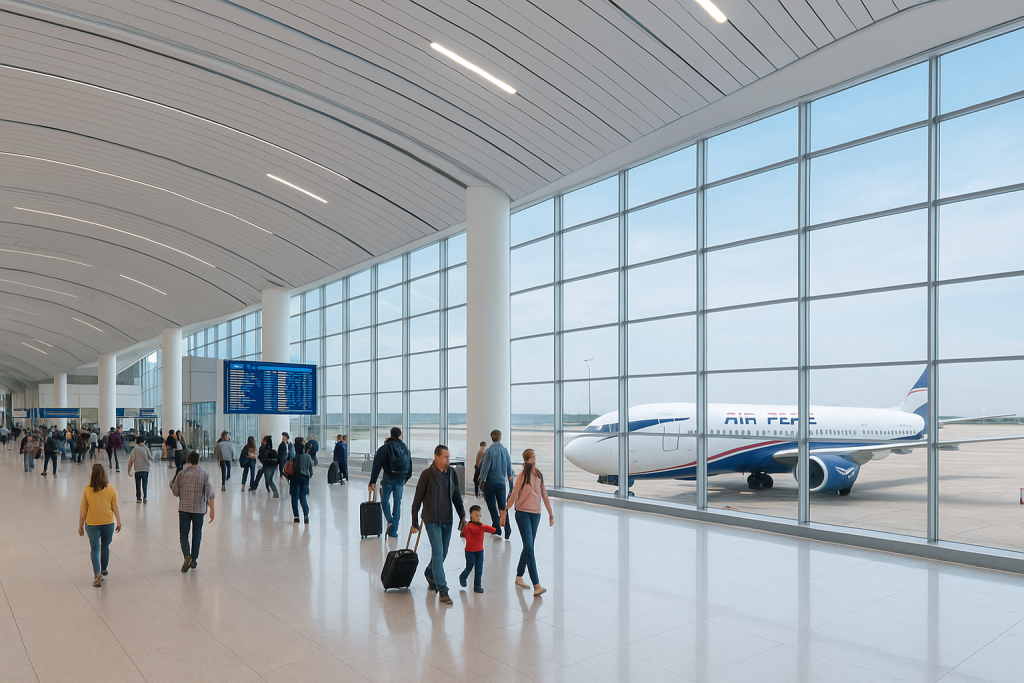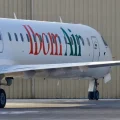
Major Nigerian airports like Lagos and Abuja undergo modernization to meet rising passenger demand.
Local Airlines Driving Domestic Air Travel in Nigeria
Several Nigerian airlines have established significant domestic networks, providing essential connectivity between major cities and regional hubs.
Leading carriers such as Air Peace, Arik Air, Ibom Air, Dana Air, and Azman Air serve the majority of domestic routes. Among these, Air Peace commands the largest fleet and route network, covering over 20 domestic and regional destinations.
Air Peace has expanded its operations to include international flights to West Africa and Europe, positioning itself as a major player in Nigeria’s aviation sector.
Ibom Air, headquartered in Uyo, has focused on regional services, prioritizing safety and customer service with a modern fleet. Despite previous operational challenges, Arik Air continues to operate domestic and select international flights.
Challenges Facing Nigerian Airlines
Nigerian carriers face several operational challenges, including high aviation fuel costs and limited airport infrastructure, which affect profitability and service delivery.
Many regional airports lack modern facilities, constraining route expansion. Airlines also operate under stringent regulatory oversight to meet safety standards set by the Nigerian Civil Aviation Authority (NCAA), which enforces compliance with international guidelines.
Also Read:Niger Governor lacks authority to withdraw Badeggi FM broadcast licence, information minister says
Additional pressures stem from competition with international airlines and economic fluctuations influencing passenger demand. These factors require Nigerian airlines to maintain operational efficiency while investing in fleet maintenance and customer experience.
International Airlines Connecting Nigeria to Global Markets
Nigeria’s airports serve as hubs for several international carriers linking the country to key global cities. Airlines including British Airways, Emirates, Lufthansa, Qatar Airways, Turkish Airlines, Ethiopian Airlines, and KLM operate flights primarily out of Murtala Muhammed International Airport in Lagos and Nnamdi Azikiwe International Airport in Abuja.
These international connections support Nigeria’s role as a regional aviation hub and facilitate trade, tourism, and business travel. Cooperation between local and foreign airlines through alliances and code-share agreements enhances connectivity and operational efficiency.
Key Nigeria’s Air Airports Supporting the Aviation Sector
Nigeria’s aviation network includes more than 30 airports, but most passenger and cargo traffic flows through three main international airports: Murtala Muhammed International Airport (LOS) in Lagos, Nnamdi Azikiwe International Airport (ABV) in Abuja, and Port Harcourt International Airport (PHC).
These airports have undergone or are undergoing modernization projects to increase capacity and improve passenger services.
Murtala Muhammed International Airport, the country’s busiest, has recently expanded terminals and upgraded security and screening processes to handle rising international and domestic traffic.
Abuja and Port Harcourt airports also play strategic roles in serving the nation’s capital and the oil-producing Niger Delta region, respectively.
Regulatory Oversight and Safety Enforcement
The Nigerian Civil Aviation Authority is charged with regulating the sector, ensuring airlines and airports meet global safety and operational standards.
Through rigorous audits, safety inspections, and enforcement actions, the NCAA maintains Nigeria’s compliance with International Civil Aviation Organization standards.
Recent regulatory focus has emphasized reducing unruly passenger incidents, improving security protocols, and enhancing airline operational safety. Continued oversight aims to elevate the country’s aviation reputation and ensure passenger confidence.
Economic Impact and Industry Outlook
The aviation sector significantly contributes to Nigeria’s economy by supporting jobs, tourism, and commerce. It enables the movement of goods and people essential to business and government operations.
Industry data shows that aviation sustains hundreds of thousands of jobs and facilitates billions in economic output annually.
Looking forward, the Nigerian aviation industry is expected to grow in line with rising urbanization, expanding middle class, and increased business travel.
Government infrastructure investments and regulatory reforms aim to improve efficiency and safety, positioning Nigeria to become a leading aviation hub in Africa.
Collaboration between airlines, airports, and regulators will be essential to overcome challenges related to infrastructure and operational costs. Continued modernization and enhanced passenger experiences are key to sustaining growth and competitiveness in the region.
Nigeria’s aviation sector, driven by both local and international airlines supported by major airports, remains central to the country’s transport and economic landscape.
While challenges persist, ongoing efforts to upgrade infrastructure and enforce safety standards promise a positive trajectory.
The industry’s future depends on balancing regulatory oversight with investment in capacity and services to meet growing passenger demand.




